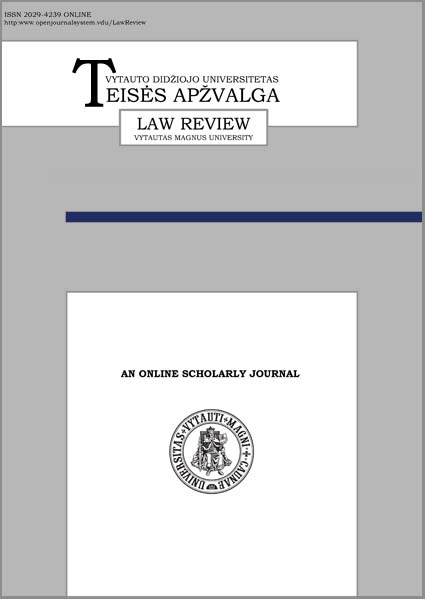Ar neblaivus asmuo turi teisę valdyti autonominį automobilį?
Whether an Intoxicated Person Has the Right to Use an Autonomous Vehicle?
Author(s): Karolis KubilevičiusSubject(s): Law, Constitution, Jurisprudence, Substance abuse and addiction
Published by: Vytauto Didžiojo Universitetas
Keywords: Autonomous vehicle; Influence of alcohol; Management concept;
Summary/Abstract: Author analyzes whether an intoxicated person has the right to use an autonomous vehicle in the context of current laws and the duty of care. In the first part of the article, the author discusses the commonalities and unique features of an autonomous vehicle. Firstly, the article compares different types of autonomous vehicles, in order to determine the concept of this type of vehicle. It is established, that henceforth the author will only focus on a fully autonomous vehicle. Secondly, once it is established which autonomous vehicle level is going to be the main focus of this article, the article distinguishes the unique features of fully autonomous vehicle and its management features. The results showed that fully autonomous vehicles can be used in any kind of environment without any interaction of a person and is expected to provide extra movement of freedom for disabled people. Furthermore, it is not enough for an autonomous vehicle to simply work as intended. The autonomous system has to be the safety net and provide the redundancy. After identifying autonomous vehicle‘s unique features, the author analyses the development progress and forecast of laws in United States of America (hereinafter – USA) and European Union. The results show, that USA is one of the leading countries in autonomous vehicle development. The ability to enact separate laws from the federal government, allows states to try out different kind of laws in order to regulate autonomous vehicle use. Meanwhile, the European Union takes a more conservative approach, by undergoing various experiments and researches in order to ascertain the safety of autonomous vehicles. It is also established that in USA, the laws do not prohibit an intoxicated person from using an autonomous vehicles, meanwhile in European Union, due to the lack of laws, it is prohibited. After establishing the unique features of autonomous vehicle, in the second part of this work, the author conducts an analysis on the duty of care and how it is affected by different amounts of alcohol and legal regulations. Firstly, taking into consideration that driving requires a great degree of care, the first paragraph analyses different regulations and case law to underline the importance of care for a driver. Afterwards, the author discusses Lithuania’s drunk driving regulations. It is established, that the prohibition to drunk driving has two aims: (1) to prevent casualties on the road and (2) to reduce alcohol consumption. Furthermore, it is established that even though the drunk driving prohibition is supposed to reduce alcohol consumption, in practice, it does not fully achieve its aim. Secondly, as study shows, even a small amount of alcohol has a negative effect on driver’s duty of care. Countries, in order to prevent road casualties and an increased alcohol consumption, use different types of limitations. After comparing several European country’s laws, it’s established that the allowed maximum alcohol limit for drivers depends on various different aspects, such as: road infrastructure, transport system, education system, number of road casualties, political and economic feasibility issues. Finally, it is established that an intoxicated person has the right to use an autonomous vehicle, but the right is not absolute. These limitations can only be determined by conducting additional studies in certain fields, such as: road infrastructure, transportation system, education system, number of road casualties and certain political and economic questions.
Journal: Teisės apžvalga
- Issue Year: 2018
- Issue No: 1(17)
- Page Range: 85-112
- Page Count: 28
- Language: Lithuanian

